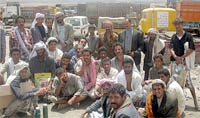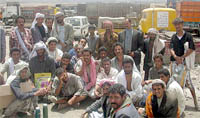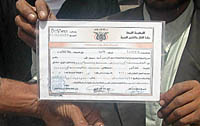
Law disrupts traffic of 2,000 trucksAll hopes dashed [Archives:2003/641/Reportage]
June 12 2003
 |
 |
It seems that legal principles and regulations set up by legislators to organize transportation could in some instances become a disaster. Such a situation can be exploited by some capitalists and private companies and influentials to serve their own interests even if that could result in devastation for whole families. Hence we dare say that we are living in a country where certain laws may serve wealthy people with the purpose of widening class differences in the society.
Observers believe that what is happening nowadays at the Ministry of Transport is a beginning of a dangerous situation the MPs should pay attention to. Even though most of the MPs themselves are only part of the whole scheme.
We are talking about the new law for transportation that when passed, it paralyzed more than 2,000 trucks owned by ordinary citizens causing families to be without income. People are because of this law, standing in long queues with their trucks waiting for permission to earn their living.
While this is the scene just outside the city entrance, some “lucky” people seem to be above the law although they really don't need to get much wealthier. Hopes were that the new minister in spite of the obvious conflict of interests due to his descent from a business family, could make a difference and put to order the chaos of transportation in the country.
The new law has given the ministry of transportation the authority to allow free competition, and allocated routes between and inside the cities so that no bias could occur towards any side. If this is what actually is happening then how come long sit-in queues of protesters are getting longer every day at the entrances of the cities?
Yemen Times met with one of the protesters, Mr. Adel Sa'ad Al-Baroory, who said: “We protest against military vehicles which have been rented to transport merchants' goods from the Hodeidah port without consideration for the lines of trucks waiting for their turn to come. We demand cancellation of the permits given to the military vehicles that transport civil goods.
Another truck driver, Mr. Ahmed Al-Matary said: “We request the president to do something about the situation, because it has caused many families to starve. “
Saeed Al-Showaf, a truck owner and driver says: “We have transport vehicles and we are committed to and abiding by the law and by the Hodeidah office for transportation's instruction and then suddenly, we are shocked to see vehicles given permits and starting to take over our own jobs. We have been for more than a month without any work.”
Mahir, another truck driver says: ” I went to the ministry and they asked me to pay YR 50,000 to grant me a permit. In fact one of the staffers there said: “give me 50,000 rials and I will give you a permit to transport any kind of goods and even without a commercial record.”
Ali Mohammed from Al-Baidha said that they will continue the sit-in until their demands are met.
The protestors call for banning the military vehicles from being used and have their military plates removed. “We will demand the cancellation of permission given by the new law for those who call themselves merchants of goods that belong to them.
They work fifteen times a month, while we work once a month,” he said.
Mr. Mohammed Mahmoud al-Matari, a lawyer said: “In order to make use of the legal texts, the following should be taken into considerations:
1-Limitations and restrictions have to be made for the benefit of the merchants as well as goods owners.
2-There should be a certain kind of clarity and openness in determining the bodies that should obey the law and start their work.
3- Putting an end to monopoly either implicitly or explicitly according to what has been stated in the law texts. The bylaw has to be stated clearly and the merchant might claim that the truck drivers are the monopolists.
4- Sorting out transport syndicate-related issues in organizing their main activities.
Article No. (7) of this law has allowed the official and non official bodies to deal with only those bodies which have permissions in order to pursue their land transportation.
It is clear that the situation will get worse of authorities do not take the appropriate measures as soon as possible. The economy depends on those truck drivers in delivering goods to the whole country and having 2,000 or more trucks not operational is not a positive sign for the future.
——
[archive-e:641-v:13-y:2003-d:2003-06-12-p:report]


